Did you know that the summer heat is problematic to animals just like it is to humans?
Under normal weather conditions, most domestic animals can regulate their body temperature to stay within the safe limits or range.
They only need access to sufficient water and shade.
But the extreme summer weather is sometimes unbearable. The exceptionally high temperatures and humidity lead to heat stress in livestock. What happens to goats during the sweltering summer heat? Do they also suffer heat stress?
In this article, we look at the optimal body temperature for goats and how hot it is too hot for them. You will also learn how to detect heat stress in goats, plus thirteen tips to help keep them cool in the summer heat. Let’s get right on it!
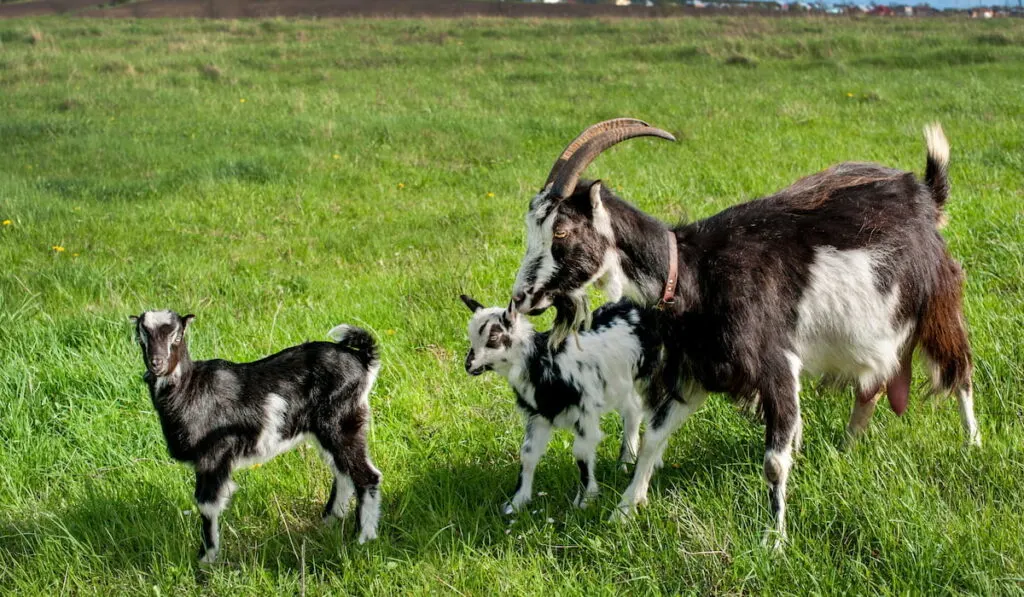
Table of Contents
How Hot Is Too Hot for Goats?
The average temperature (rectal) for goats is 101.5°F – 103.5°F (38.6°C – 39.7°C).
If this temperature rises above 105ºF (40.5°C), the goats may experience heat stress.
Rectal temperature increases beyond 107ºF (41.6°C) can lead to cell degeneration and death.
Therefore, watching your goats in summer is crucial to avert risks. You can tell your goats are suffering from heat stress if they show the following signs:
- Breathing rapidly
- Low feed intake
- Panting continuously
- They are generally weak
- They are unable to stand
- Their rectal temperature is above 105ºF (40.5°C)
The Temperature Humidity Index (THI) directly influences heat stress. The table below indicates the relationship between THI and heat stress in goats.
| Temperature (ºF/°C) | Relative humidity (%) | Temperature Humidity Index (THI) | Stress level |
| Below 90°F / 32.2°C | Below 55 | Below 82 | No stress |
| 90°F / 32.2°C | 55 to <65 | 82 to <84 | Moderate |
| 90°F / 32.2°C | 65 to <75 | 84 to < 86 | Severe |
| 90°F / 32.2°C | ≥75 | ≥86 | Extreme |
Some of the actions you can take to prevent or minimize heat stress in your goats include:
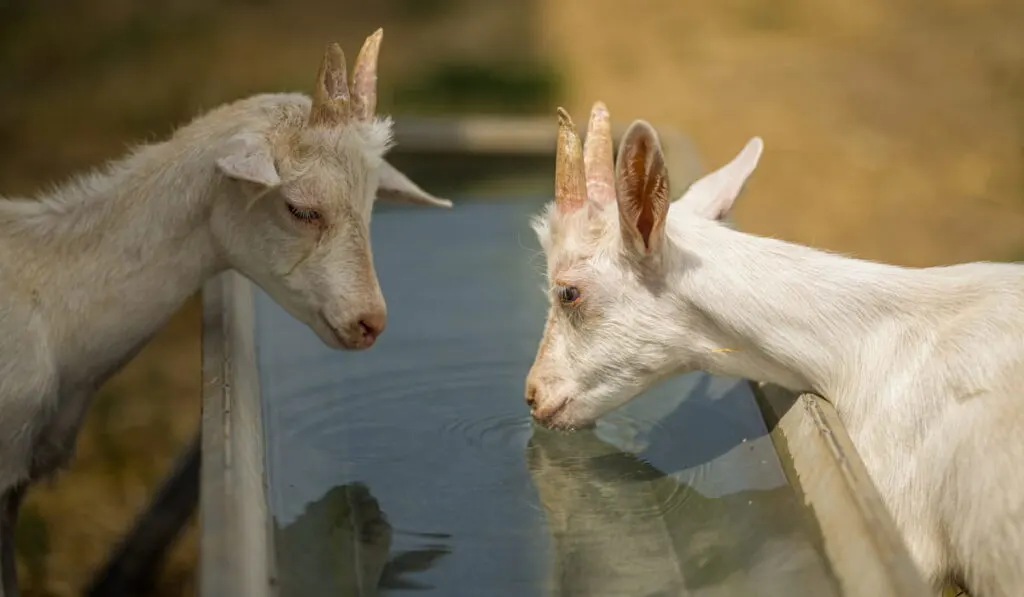
1. Keep Your Goats Hydrated
Water is essential for your livestock, especially in summer.
Supplying your goats with plenty of clean and fresh drinking water is the best way to keep them cool in the heat of the day.
Also, keep changing the water to ensure it is fresh and suitable for your goats.
2. Install Misters in Your Barn
Misters help lower the surrounding temperatures through evaporation. They spray a little water and let it evaporate before running again. The evaporation process helps keep the goats cool by reducing the external temperatures.
Misters are ideal for installing in the barn for housed goats.

3. Build Caves for Your Goats
Goats have a lot of fun when they have plenty of spaces where they can hide. And such areas are handy when it’s hot. One of the best options for hiding space is underground. You can dig up trenches or holes, leaving goat-sized entries.
Your goats will take only a short time before they are accustomed to running in and out of the caves. And it will be an excellent refuge for them when the days get hotter than hot in the summer.
4. Install Cooling Fans in Your Barn
There must be more than windows and vents to keep your barn cool on hot summer days. For housed goats, ensure you install cooling fans to facilitate air circulation.
Fans are a great help in cooling your livestock by enhancing the process of perspiration.
Combining fans with misters will also speed up evaporation. Install the fans above the ground to prevent accidents like chewing on power cables.
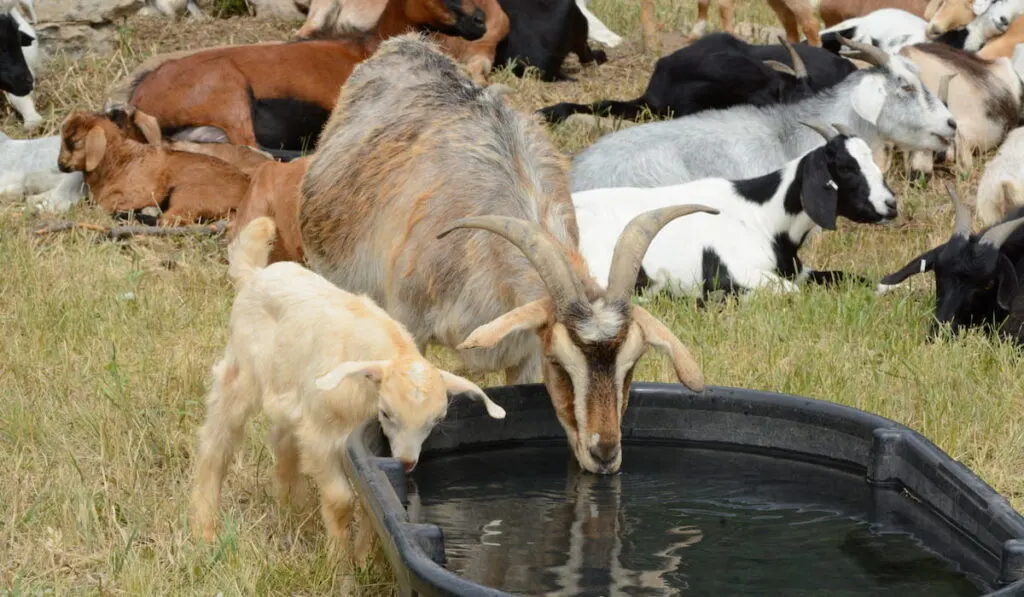
5. Use Frozen Water Bottles
Innovation and creativity are significant assets in your journey as a livestock farmer. For instance, you can fill empty bottles with water and freeze them.
On hotter days, you can place the frozen water bottles in the water troughs. Doing this will help keep the water cool and taste fresh, enticing your goats to drink more. Also, the goats can lick the bottles, lowering their body temperature.
Alternatively, you can strategically position the bottles in the pen for goats to rub against them.
6. Provide Sufficient Shade
Shade is paramount to keeping your livestock cool in the day’s heat. Ensure your goats have enough shade cover over their grazing area.
Trees offer the best cost-effective and natural shade that allows them to graze during hot days.
Moreover, goats can rest, play, and relax under trees. If there are no mature trees on your farm, you can construct simple structures to provide shelter.
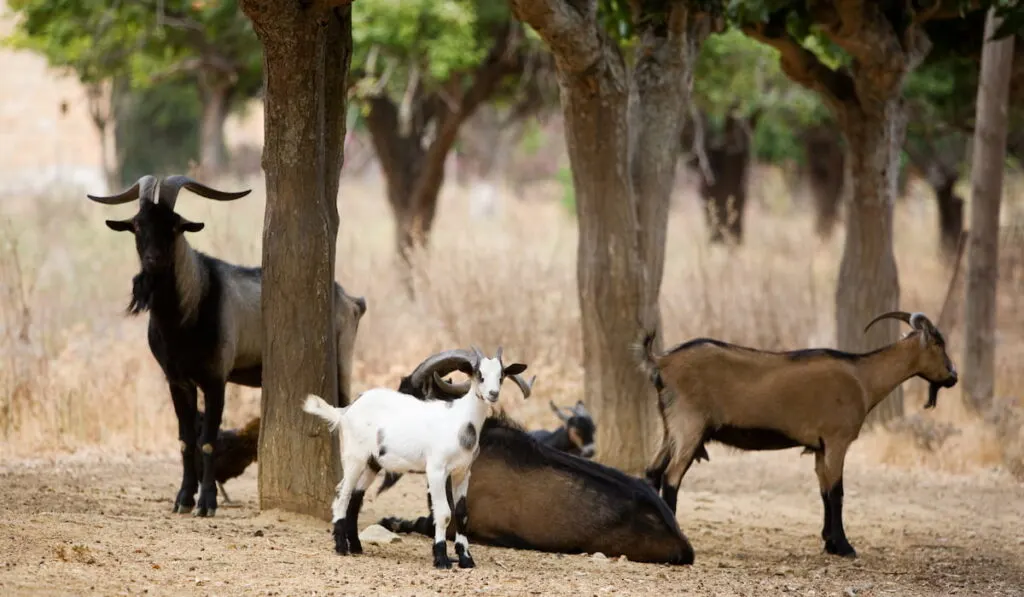
7. Place Their Hay Under Trees or Shelter
Metabolic activities produce heat, increasing the animals’ body temperature. Exposure to the sun’s heat causes goats to reduce feed intake as a protective mechanism. Prolonged low feed intake negatively affects milk production in dairy goats.
The goats’ weight will significantly reduce, impacting meat production too. Placing your goat feeders under the trees or shelter will help encourage them to keep feeding.
8. Ensure the Barn Is Well-Ventilated
Efficient air circulation helps enhance perspiration in animals. Perspiration is a process by which animals lose heat through sweating. Poor ventilation in your barn can slow the rate at which sweat evaporates, leading to heat stress.
Ensuring there is adequate ventilation will facilitate seamless air circulation. And it will help keep your goats cool in the day’s heat.
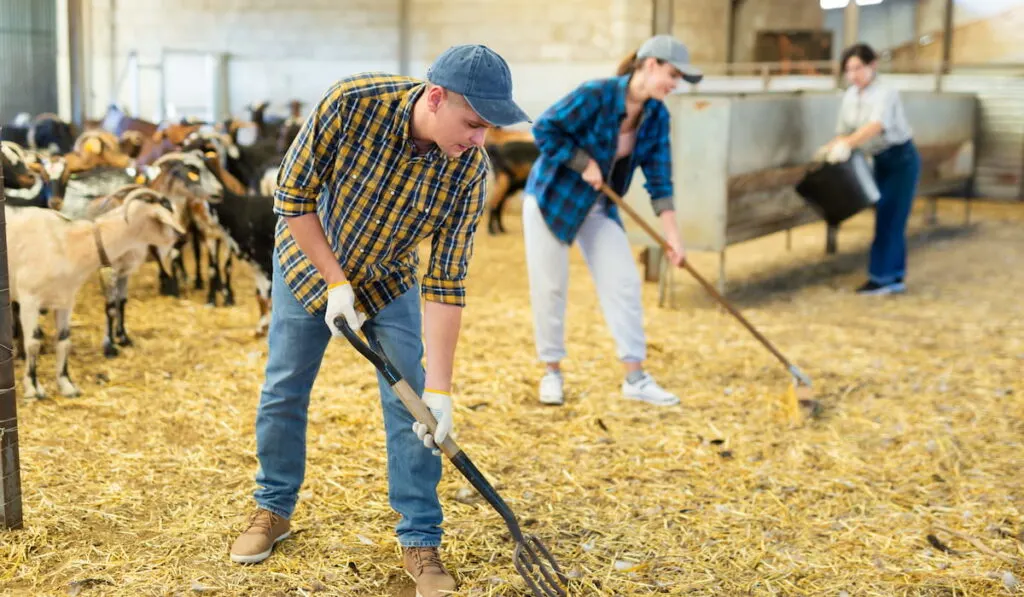
9. Avoid Cleaning Their Area During the Day
Most livestock, including goats and sheep, enjoy relaxing under shade during the day’s heat. Disrupting them during this time adds to the stress. Extreme summer weather conditions require flexibility to ensure your animals’ comfort.
Adjust cleaning time to early in the mornings or evenings to avoid stressing your goats.
10. Don’t Transport or Handle Goats When It’s Hot
Activities such as sorting, immunizing, or transporting your goats are stressful for them. Doing this in the heightened heat of the day may worsen the situation and lead to heat stroke or death.
Avoid handling your goats in the extreme summer heat; if it’s inevitable, do it in the early mornings when temperatures are optimal. Also, consult your vet on safe and least stressful handling methods.
11. Build Them Trampolines
Goats are naturally playful animals and enjoy raised hanging out spots. Providing them with trampolines under trees is one of the best methods of keeping them cool.
Trampolines have holes through which air can circulate. The air circulation will help cool the goats while lying on them in the day’s heat.
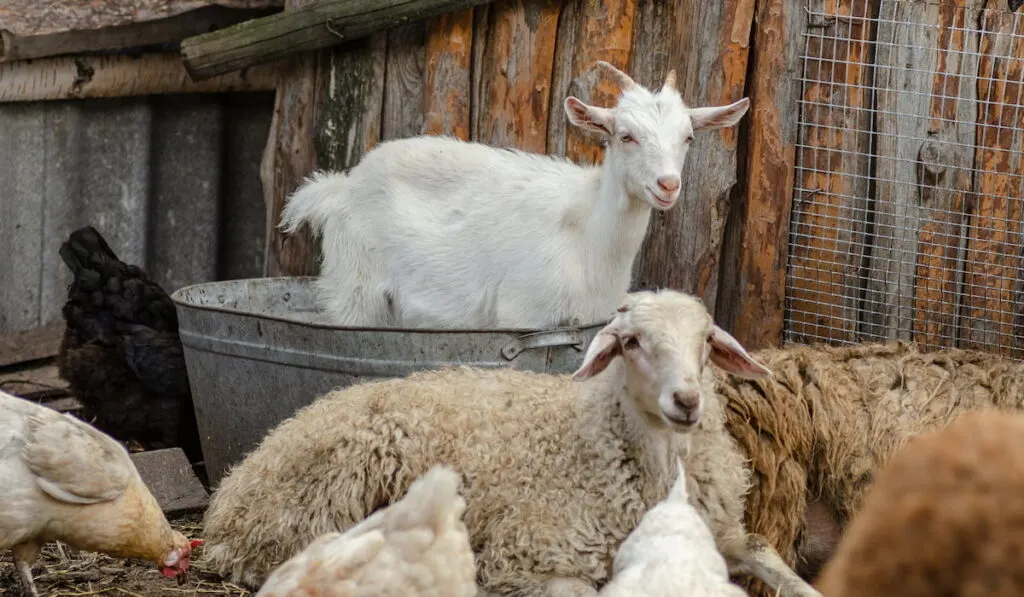
12. Rinse the Goats
Rinsing your goats can help keep them cool. Also, it facilitates hair growth and is ideal for show animals.
But spraying cold water on a hot animal could shock its system, and you should do it when temperatures are low. Moreover, it is safer to seek the vet’s guidance to prevent accidents.
13. Monitor Their Body Temperature
The best way to quickly determine if anything is wrong with your goats is by checking their body temperatures. Ensure you have a digital thermometer for taking rectal temperatures periodically.
If you notice a higher-than-average body temperature (above 105ºF/40.5°C), take the goat to a cooler and well-ventilated space.
Contact your vet should the temperature not come down because it could be a sign of sickness.
Therefore, temperature monitoring is crucial in ensuring your goats are healthy and comfortable.
Final Thoughts
Whether you have your goats housed or on a free-range farm, you have numerous options to keep them cool in summer. You need a digital thermometer for checking their temperature, some creativity, and passion for your animals.
Whatever you do, ensure your goats are comfortable and healthy. And you will enjoy looking after your animals and high yields.
Resources
I wrote this article using my experience raising goats and the following sources:
